Double U-Turn on Health Care
 There are some cynics who complain that the Scottish Parliament is a dull place which endlessly debates issues which do not affect "real" people. But this week, at least one political commentator was complaining that it was just too exciting as the Executive twisted and turned on the question of payment of care for the elderly.
There are some cynics who complain that the Scottish Parliament is a dull place which endlessly debates issues which do not affect "real" people. But this week, at least one political commentator was complaining that it was just too exciting as the Executive twisted and turned on the question of payment of care for the elderly.
The subject has been rumbling for some months, if not for years. In 1999, a commission under Sir Stewart Sutherland, set up by the UK government, reported on how society should meet the costs of caring for the elderly in the future. It recommended that there should be free care for all, regardless of wealth. Until then, medical care was free but "social" and "personal" care was charged - if the individual could afford to pay. This meant that people who had saved or had their own house, had to use up their capital, perhaps by selling their house, while those who had spent all they earned during their lives got free care. But the government in Westminster turned down the proposals, saying the cost of over a billion pounds was too high.
In Scotland, when Donald Dewar was First Minister, the same line was followed but when Henry McLeish became First Minister towards the end of last year, he suggested that the question should be reviewed again and that he was keen to see full implementation of the Sutherland Report. This raised expectations. But when Susan Deacon, the Scottish Health Minister made a statement on Wednesday which said that "personal care" and "hotel" costs of residential care would continue to be means tested and anyone with over 18,000 pounds would have to continue to pay these costs. Exceptions were those with Alzheimer disease. When Nicola Sturgeon, the Scottish National Party spokeswoman on health responded angrily with "This statement will be seen with dismay across Scotland" she was not far off the mark.
It then became clear during one of the stormiest debates ever seen in the Scottish Parliament, that the Liberal Democrats, Labour's coalition partners were not prepared to go along with the decision. And whereas on a previous occasion the Lib-Dem leadership had managed to quell rebellion amongst their MSPs over fees for University education, they did not appear to even try this time. And a number of Labour back-bench MSPs may well have indicated that they would join them. The Executive appeared to be heading for a serious defeat on the issue.
But amid chaotic scenes on Thursday, Tom McCabe, the minister for parliament, made an emergency statement at just after 5pm. He promised that the Executive would deliver proposals later this year on how to achieve free personal care for those who need it. There were whoops of triumph from Liberal Democrats (and many Labour MSPs) that a deal had ben crafted - somehow. As the words used were later put under the spotlight, however, there were concerns that the statement was full of political double-talk and did not guarantee implementation of free care for the elderly. But any backsliding is likely to be met with the same opposition - though admittedly that will probably be after the General Election for the Westminster Parliament, widely expected to be in May.
Democracy and Devolution Working Well
 The health care for the elderly issue has demonstrated the power of democracy in the Scottish Parliament. With an Executive unwilling or unable to listen to the mood of the majority of the voters, it was clear that a majority of the elected representatives were prepared to challenge the decision. Secondly, despite wails from Westminster, the Scottish Parliament is allocating resources according to the priorities of Scotland. This puts pressure on them to follow Scotland's lead though the prospect of an army of zimmer-frames marching up to Scotland for free health care is not thought likely.
The health care for the elderly issue has demonstrated the power of democracy in the Scottish Parliament. With an Executive unwilling or unable to listen to the mood of the majority of the voters, it was clear that a majority of the elected representatives were prepared to challenge the decision. Secondly, despite wails from Westminster, the Scottish Parliament is allocating resources according to the priorities of Scotland. This puts pressure on them to follow Scotland's lead though the prospect of an army of zimmer-frames marching up to Scotland for free health care is not thought likely.
There are suspicions that pressure was brought to bear on the Labour leadership in Scotland to make the same decision as in England and Wales. But the Executive now have a perfect "excuse" having been forced by the prospect of a damaging defeat in the Scottish Parliament if they had not done so. Of course, the Liberal Democrats are getting most of the political benefit which Henry McLeish may have been wanting to achieve for the Labour party when he set this particular hare running. Instead he had to swallow a humiliating climb-down. But that's politics!
Dr John Reid Appointed Northern Ireland Secretary
Peter Mandelson, the Northern Ireland Secretary, was forced to resign this week and the Scottish Secretary, Dr John Reid, was immediately appointed in his place. Dr Reid is the first Roman Catholic to be Northern Ireland Secretary - and he is also the 13th to be appointed to what many regard as the toughest job in British politics. However, he is regarded as a "safe pair of hands" to deal with the complex issues of the troubled province. He has a sharp brain, (his PhD is in economic history), absorbs a new subject quickly and is a hard-headed negotiator. Media attention has highlighted his love of Celtic football club, which enjoys the support of many Catholics in Glasgow. Perhaps to show impartiality, his deputy will be Adam Ingram, a lifelong fan of Rangers football club. A widower, the chain-smoking Dr Reid still retains a love of pop music - he played in a band when younger and still takes part in amateur "gigs" whenever he gets the opportunity.
First Female Scottish Secretary
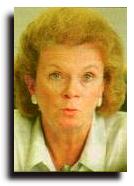 With John Reid's departure to be Northern Ireland Secretary (see previous item) Helen Liddell was appointed to be the first woman to hold the post. She is a hard-nosed politician with a reputation for tough talking - her nickname at one time was "Stalin's Granny". Mrs Liddell entered Parliament at Westminster in 1994, having worked earlier in the BBC, the Scottish Trades Union Council and as general-secretary of the Labour Party in Scotland. She also worked for a spell as personnel director at the Scottish Daily Record and Sunday Mail when they were owned by the tycoon Robert Maxwell. She has been Transport Minister and Minister for Energy in Tony Blair's government but this will be the first time that she has held a Cabinet post. Mrs Liddell's deputy at the Scotland Office will be George Foulkes, the MP for Carrick, Cumnock and Doon in Ayrshire.
With John Reid's departure to be Northern Ireland Secretary (see previous item) Helen Liddell was appointed to be the first woman to hold the post. She is a hard-nosed politician with a reputation for tough talking - her nickname at one time was "Stalin's Granny". Mrs Liddell entered Parliament at Westminster in 1994, having worked earlier in the BBC, the Scottish Trades Union Council and as general-secretary of the Labour Party in Scotland. She also worked for a spell as personnel director at the Scottish Daily Record and Sunday Mail when they were owned by the tycoon Robert Maxwell. She has been Transport Minister and Minister for Energy in Tony Blair's government but this will be the first time that she has held a Cabinet post. Mrs Liddell's deputy at the Scotland Office will be George Foulkes, the MP for Carrick, Cumnock and Doon in Ayrshire.
The State of the Nation
Statistics published this week by the government's Office of National Statistics predict that while UK population will rise from just under 60 million to over 64 million by 2036, the population of Scotland is likely to fall slightly over the same period. The main reason for Scotland's population decline is emigration - 55,000 people left Scotland last year to live in other parts of the UK or abroad. Only 49,000 people moved in to Scotland last year. The Social Trends statistics also show that more Scottish men and women die in most age groups than anywhere else in the UK - due to poor diet, smoking, drinking, lack of exercise and poor housing. Scots spend more time watching TV than anywhere else in Britain. Social security benefits paid to those who cannot or will not work is over 10 billion pounds a year.In 1946-7, there were over 43,000 marriages in Scotland. In 1997 the number had reached just under 30,000 with the biggest reduction in church marriages.
Crisis for Fishing Industry
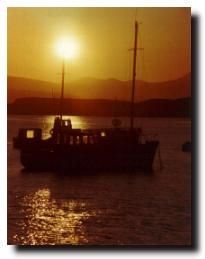 For many years now, fishermen and their representatives have lobbied vehemently against any reductions in fishing quotas in the North Sea and around our shores. They consistently disagreed with the estimates of scientists that fish stocks were falling to unacceptable levels. But the size of catches declined each year, to such an extent that the quotas allocated by the European Union could not even be found. It has become clear that unless drastic measures were taken to allow stocks to recover, there would be no fish left to catch. So this week the EU announced the closure of large areas of the spawning grounds in the North Sea for the fishing of cod between mid-February and the end of April. Other measures, such as the introduction of nets which will allow small fish to escape, will also be introduced. But fishermen are demanding a government subsidy of 100 million pounds to allow them to weather the storm of the fishing ban. While other fish such as whiting can continue to be caught, these are regarded as low yield and uneconomic.
For many years now, fishermen and their representatives have lobbied vehemently against any reductions in fishing quotas in the North Sea and around our shores. They consistently disagreed with the estimates of scientists that fish stocks were falling to unacceptable levels. But the size of catches declined each year, to such an extent that the quotas allocated by the European Union could not even be found. It has become clear that unless drastic measures were taken to allow stocks to recover, there would be no fish left to catch. So this week the EU announced the closure of large areas of the spawning grounds in the North Sea for the fishing of cod between mid-February and the end of April. Other measures, such as the introduction of nets which will allow small fish to escape, will also be introduced. But fishermen are demanding a government subsidy of 100 million pounds to allow them to weather the storm of the fishing ban. While other fish such as whiting can continue to be caught, these are regarded as low yield and uneconomic.
Scotland Leads in Stem Cell Research
Parliament agreed this week to allow stem cell research using cells from human embryos up to 14 days old. It is hoped that the research will lead to cures for a range of degenerative diseases including Parkinson's, Huntington's and diabetes. PPL Therapeutics and the Roslin Institute near Edinburgh, who cloned the world's first sheep, will be in the forefront of such research. An initial target is to generate nerve cells for these diseases and also for the repair of spinal injuries and damaged heart muscles.
Green Light for Motorway Link
The 250 million pound project to complete the five mile M74 link to the M8 south of Glasgow got an official go-ahead from the Scottish Executive this week. The central government will provide 214 million pounds of the cash required, with the local council authorities in South Lanarkshire, East Renfrewshire and Glasgow providing the balance. The link will have three lanes in each direction and four interchanges along its length to allow traffic to enter and leave the trunk road.But the new section of motorway will not be ready until 2008.
Amazing Escape From Aircraft Crash
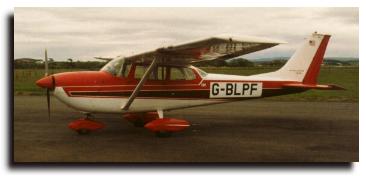 A Cessna 172 light aircraft, on its way from Oxford to Inverness, crashed at high altitude onto a plateau in the Lochnagar area of Aberdeenshire on Thursday. The four occupants not only survived the crash but also the freezing temperatures, before being rescued by a rescue helicopter. The plane had been flying in thick cloud when it struck the ground and overturned. One of the three men and one woman had a broken leg and the others suffered cuts and bruises. They left the site of the crash and made their way to a sheltered corrie. Three hours later they were spotted by the search and rescue helicopter which was homing in on a distress beacon from the aircraft. The pilot and three passengers were taken to Aberdeen Royal Infirmary.
A Cessna 172 light aircraft, on its way from Oxford to Inverness, crashed at high altitude onto a plateau in the Lochnagar area of Aberdeenshire on Thursday. The four occupants not only survived the crash but also the freezing temperatures, before being rescued by a rescue helicopter. The plane had been flying in thick cloud when it struck the ground and overturned. One of the three men and one woman had a broken leg and the others suffered cuts and bruises. They left the site of the crash and made their way to a sheltered corrie. Three hours later they were spotted by the search and rescue helicopter which was homing in on a distress beacon from the aircraft. The pilot and three passengers were taken to Aberdeen Royal Infirmary.
The illustration is of a Cessna 172, the type of aircraft involved in the crash.
Round the Clock Surveillance
Closed circuit TV (CCTV) surveillance cameras are regarded as a valuable way of reducing crime in streets in cities and towns across Scotland. Now Glasgow City Council has put forward a plan to double the number of cameras from 200 to 400 - at no extra cost. The plan is to feed the pictures from the cameras into one central location, instead of the present four police stations where they would be monitored 24 hours a day. This would save money which would allow for the extra cameras. But the scheme needs extra cash to create the new control centre in the first place. Surveys show that far from seeing the cameras as a "Big Brother" intrusion into privacy, the public like CCTV, believing that it helps to cut crime and increase safety on the streets, car parks and railway stations.
Gasworks May Delay Billion Pound Development
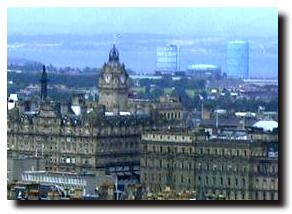 The project to redevelop Edinburgh's waterfront at Granton is getting bigger according to a new masterplan published this week. The number of houses is set to rise by 1,500 to 6,500 and it will create 13,500 jobs, more than twice the number originally estimated. But to achieve all this, higher density building will be required and three disused gasholders will have to be demolished, one of which is a "listed building" which Historic Scotland wants retained. Opposition from heritage groups may result in a public enquiry having to be held, causing lengthy delays to the whole project. The cost of the development is now put at one billion pounds.
The project to redevelop Edinburgh's waterfront at Granton is getting bigger according to a new masterplan published this week. The number of houses is set to rise by 1,500 to 6,500 and it will create 13,500 jobs, more than twice the number originally estimated. But to achieve all this, higher density building will be required and three disused gasholders will have to be demolished, one of which is a "listed building" which Historic Scotland wants retained. Opposition from heritage groups may result in a public enquiry having to be held, causing lengthy delays to the whole project. The cost of the development is now put at one billion pounds.
The illustration shows the gasometers in the distance from the centre of Edinburgh, showing how obtrusive they are.
Attacks on School Teachers Rise By 50%
During 2000, there were over 3,000 reported attacks on school teachers in Scottish schools, 50% more than in 1999. More than half of the attacks involved physical assault. And it is not just older pupils who are involved - primary school pupils of under the age of eleven can be just as disruptive. Trade Unions say that the policy of encouraging schools not to expel unruly pupils has created a "thugs charter". Nearly 200 pupils were reported to the police for assault.
Anger at School Merger Plans
Parents of pupils at the private all-girls school Laurel Park are threatening legal, action following a decision by the school board of governors to merge with the co-educational Hutcheson's Grammar School. They are angry that the governors reached their decision without consulting the parents of the 400 pupils attending Laurel Park School. Parents of Hutcheson's School pupils are also unhappy as they believe the school is already too large. Laurel Park is run by a charitable trust and parents are looking at ways of challenging the decision. Fees at Laurel Park range from 805/1662 pounds a year. Hutcheson's Grammar fees range from 1310/1580 pounds a year.
University Embarrassment Over Honorary Degrees
 Secret plans by Glasgow University to award honorary degrees to a number of celebrities as part of the celebrations for their 550th anniversary were uncovered by a "mole" and published this week in a student magazine. 80 names were on the list - and none of those involved had even been contacted by the University. So there were red faces amongst the university authorities who are organising the "550 years of excellence" events. Included in the list published by the student's magazine are Billy Connolly, Alex Ferguson, Colin Montgomery, Jackie Stewart and the current Lord Provost Alex Mosson.
Secret plans by Glasgow University to award honorary degrees to a number of celebrities as part of the celebrations for their 550th anniversary were uncovered by a "mole" and published this week in a student magazine. 80 names were on the list - and none of those involved had even been contacted by the University. So there were red faces amongst the university authorities who are organising the "550 years of excellence" events. Included in the list published by the student's magazine are Billy Connolly, Alex Ferguson, Colin Montgomery, Jackie Stewart and the current Lord Provost Alex Mosson.
Haggis Sales Boom
In the run-up to the peak of the Burns Supper "season" (around the anniversary of his birth on 25 January 1759) large quantities of haggis are consumed all around the world. Consumption is rising, even in England and the supermarket chain Sainsbury's alone has ordered 250,000 haggis, weighing 77 tons, from a firm in Dunning, Perthshire. The order is up by 250% on last year.
New Company for Silicon Glen
The European HQ of Motech Software, a global IT consultancy and software company, is to be built at Livingston, 14 miles west of Edinburgh. This is the latest success for Scotland's "Silicon Glen" technology sector and will create 250 new jobs in the next 12 months.
End of An Era on the High Streets
 A retail store chain which has operated on the nation's High Streets for almost 80 years closed all its stores this weekend. C&A, which had 62 outlets selling clothing in the UK, is based in Holland and it is continuing to trade in ten other countries in Europe through 450 stores. But it had found competition too fierce in recent years and the UK operation made a loss of 65 million in 1999. Many of the vacated stores are being taken over by other traders.
A retail store chain which has operated on the nation's High Streets for almost 80 years closed all its stores this weekend. C&A, which had 62 outlets selling clothing in the UK, is based in Holland and it is continuing to trade in ten other countries in Europe through 450 stores. But it had found competition too fierce in recent years and the UK operation made a loss of 65 million in 1999. Many of the vacated stores are being taken over by other traders.
"Urban Village" for Dundee
Like many other cities, Dundee suffers from the fact that many of the higher-paid workers there prefer to commute from homes outside of the city boundary. But a developer has put forward a bold plan to create an "urban village" on a site at Panmurefield on the eastern boundary, with 350 up-market executive houses costing over 200,000 pounds each (US$290,000) plus a primary school, a church or community centre and office accommodation. The 90 million pound scheme is to be submitted to the Planning Committee of Dundee City Council. If implemented, the development would add significantly to the local authority's tax income. But it will mean giving up part of the "green belt" around the city and there will therefore be a fierce argument about the proposals.
Prestwick Airport Sold
 Prestwick International Airport was sold this week by Stagecoach Holdings after months of speculation. The price is estimated to have been about 33 million pounds - a loss of 8 million pounds on the price paid by Stagecoach in 1998. The new owners say that they hope to increase the existing maintenance, repair and overhaul work carried out on the site. While low cost airlines such as Ryanair use Prestwick as a base for its regional network, Prestwick is 30 miles from the population centres of Glasgow and central Scotland. But Prestwick will be one of the few airports in Europe capable of handling the new 550-seat Airbus A380 superjumbo when it enters service in 2004.
Prestwick International Airport was sold this week by Stagecoach Holdings after months of speculation. The price is estimated to have been about 33 million pounds - a loss of 8 million pounds on the price paid by Stagecoach in 1998. The new owners say that they hope to increase the existing maintenance, repair and overhaul work carried out on the site. While low cost airlines such as Ryanair use Prestwick as a base for its regional network, Prestwick is 30 miles from the population centres of Glasgow and central Scotland. But Prestwick will be one of the few airports in Europe capable of handling the new 550-seat Airbus A380 superjumbo when it enters service in 2004.
Last Picture Show
The only cinema remaining in the centre of Inverness closed this week. The La Scala has been in operation for 88 years but with a final showing of the sixty-year-old film "Casablanca" they won't be playing it again, Sam, any more. The night before, they showed "Loch Ness" starring Ted Danson which had its world premiere at the La Scala in 1996. The death knell was in 1998 when a seven-screen multiplex cinema opened on the outskirts of the town, which is often called the "Capital of the Highlands."
Money Galore
When the cargo steamer SS Politician was wrecked off the Hebridean island of Eriskay in February 1941, it was carrying more than the 20,000 cases of Scotch whisky which became the basis of the Compton MacKenzie novel and film "Whisky Galore" (known as "Tight Little Island" in North America). Documents released this week show that it was also carrying 290,000 banknotes for the then colony of Jamaica. It was well known that the islanders removed a good quantity of the whisky before the ship eventually sank but these newly released papers also show that within months of the shipwreck, the Jamaican notes began turning up throughout the UK - showing signs of being soaked in sea water. But many of the notes have never turned up. Local children may still be using them as money in the board game Monopoly.
Scottish Salmon in the Net
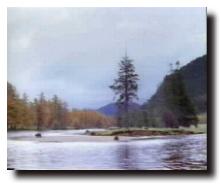 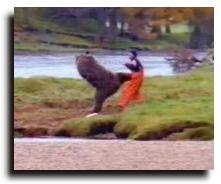
The John West Salmon advert, showing a fisherman trading punches with a bear who has just caught a salmon, has been sweeping the Internet. The bear eventually loses out - despite resorting to clever kick-boxing techniques. The hilarious 30-second sequence has become a cult object on the Web, despite weighing in at 1.4mb (that's the file, not the salmon). The sequence looks as though it was shot in Alaska but in fact it was filmed on the river Dee, near Balmoral, the Queen's summer residence in Scotland. 50,000 people a day are downloading the advert and it has been the top rated advert on Adcritic.com for the last four weeks. The advert was made by a British company on the Invercauld Estate and the bear suit was created by the company which creates the puppets for the Muppets and Sesame Street. If you want to see the advert, try here.
Do remember that file size of 1.4mb though!
Weather in Scotland in 2000
The weather in Scotland in 2000 was warmer, wetter and sunnier than the average for 1961-1990 nearly everywhere. Temperatures were 0.6C/1.08F degrees higher than the average. The last four years have all been above the norm, making it the warmest four-year period in the record books. The south-east had above average rainfall in 2000, with Edinburgh having its wettest year since 1954. The island of Tiree in the Inner Hebrides had above average sunshine on eleven out of the twelve months and the annual total of 1,659 hours of sunshine was the highest since records began there in 1927.
Weather in Scotland in December
The weather statistics for December 2000 show that the eastern half of the country was milder than usual, with some north-east areas a full degree warmer than average. This was despite a cold spell at the end of the month which brought the heaviest snow for five years to many areas - over a foot of snow in suburban Glasgow and in Ayrshire. While earlier in the month, temperatures were as high as 13C/55F, they fell to -15C/5F overnight in some places in the last week of December. Sunshine was also above average in some parts of the east and also in some of the western isles. The mild weather in the first weeks of the month also brought a lot of rain - Tyndrum, often one of the wettest places in Scotland, had over 11 inches of rain in the first nine days of the month.
Weather in Scotland This Week

Unfortunately for those hoping to participate in the first "Bonspiel" curling match on the ice of Loch Leven, the weather turned a bit milder last weekend and the ice did not reach the required eight inches. Nevertheless, a few curlers made do with a smaller friendly match instead. The rest of the week was a mixture of sunshine, cloud and showers. Temperatures were not all that high - around 6/7C (43/45F) and the forecast is for a return of colder weather again.
The heather illustrated here was pictured earlier this week- in a hospital car park.
|


![]() The Scottish Snippets Newsletter in its original format began in April 1997 and continued in an unbroken series for 591 issues. Although no longer produced in that format there is now a regular update on the new and updated pages on the Rampant Scotland site and also "Scottie's Diary" on an intermittent basis, To receive this, kust send an e-mail to Scottie with "Subscribe Newsletter" in the subject line.
The Scottish Snippets Newsletter in its original format began in April 1997 and continued in an unbroken series for 591 issues. Although no longer produced in that format there is now a regular update on the new and updated pages on the Rampant Scotland site and also "Scottie's Diary" on an intermittent basis, To receive this, kust send an e-mail to Scottie with "Subscribe Newsletter" in the subject line.
 Current Affairs
Current Affairs Historical Affairs - Topical Items from Scotland's Past
Historical Affairs - Topical Items from Scotland's Past Entertainment
Entertainment Sport
Sport Places to Visit in Scotland
Places to Visit in Scotland Scottish Recipes
Scottish Recipes Did You Know?
Did You Know?

